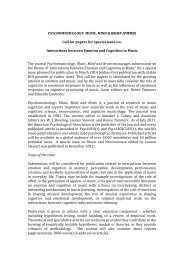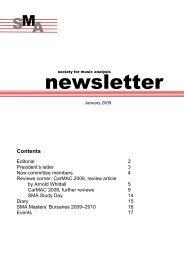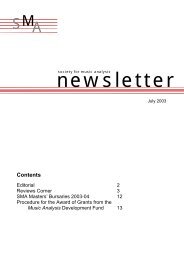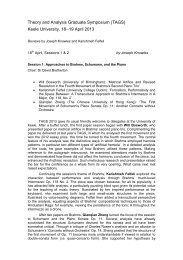Here - Society for Music Analysis
Here - Society for Music Analysis
Here - Society for Music Analysis
You also want an ePaper? Increase the reach of your titles
YUMPU automatically turns print PDFs into web optimized ePapers that Google loves.
Auditory Stream Segregation and GroupingStructure: Perceptual Organization of theMinimal Works «Piano Phase» By Steve Reichand «Phrygian Gates» By John AdamsIn this project we attempt to provide analytic insights into the minimal compositions Piano phase bySteve Reich and Phrygian Gates by John Adams, based on general perceptual principals of auditorystreaming and fundamental low-level grouping principles. We also examine the notion of musicclosure, as it is perceived in the tonal structure of the two compositions (not belonging to anyestablished tonal system), and the expectations that are created within a larger <strong>for</strong>m.The two compositions are created following a strict <strong>for</strong>mal process; this type of music is referred toas process music. Piano Phase is based on a continuously repeating 12-note melodic figure that isplayed initially synchronously on two pianos moving gradually out of phase. Phrygian gates is basedon a repetitive cell structure that moves through the circle of fifths oscillating between the phrygianand lydian modes.In both musical works auditory stream segregation principles and auditory grouping principles allowvarious rhythmic, melodic, harmonic patterns to emerge within a seemingly homogeneousunstructured musical surface that has been created by a more or less ‘mechanistic’ process.The current study shows how musical perception can play a direct role in musical analysis and how itcan provide new insights in our understanding of musical structure.Maria DavelouAristotle University of Thessaloniki, Greecemdavelou@hotmail.comA/V Requirements: Computer projector <strong>for</strong> Power Point slides, Sound System







